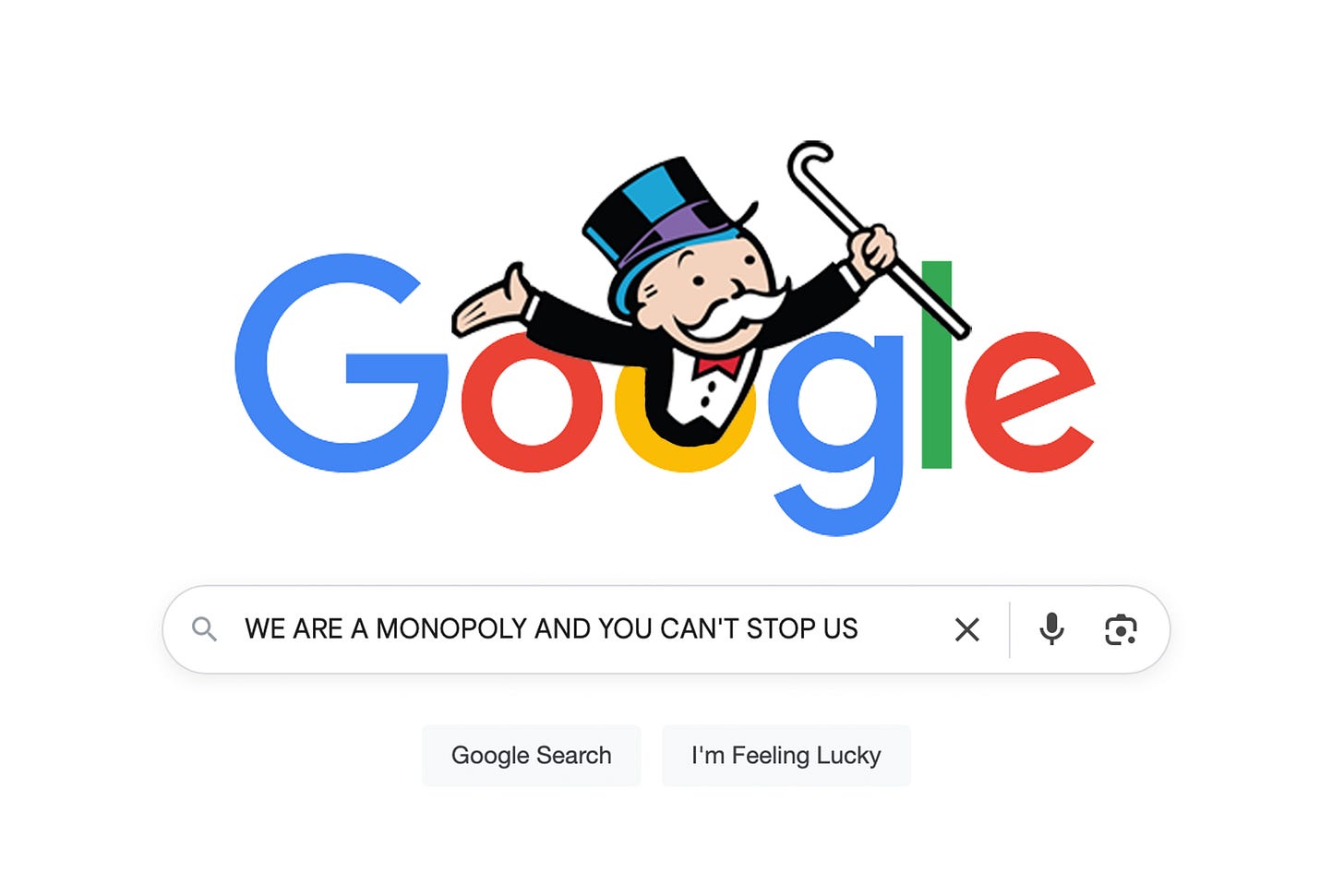Sorry Folks, Tech Monopolies Are Here to Stay
Earlier this year, Google was declared an "illegal monopoly."
In what was a landmark ruling, the company was sued for anti-competitive practices (example: Google has paid 180 billion dollars to make sure its search product is the default on Apple and Samsung smartphones), and judges threatened them with a forceful break-up, pushing to make Google sell off its Chrome Browser and potentially its Android division.
Action against Big Tech, the results of which might benefit users? Quite the statement.
A few months on, the punishment has been served. Except, it's less of a punishment and more of a watered-down slap on the wrist. Rather than deliver anything meaningful, Google has been given a 'pass go' to continue crushing the competition by any means necessary, whether that's neutering its visibility or opening its endless chequebook.
In the end, Google will be forced to share some search data with its competitors around search index, user-interaction and search text, and put some restrictions on the payments it uses to get default status in browsers and on smartphones. Those restrictions are that it can no longer demand exclusivity.
That's it. No sell-offs. No break-up. No meaningful transparency. No changes that would allow these products to move into the hands of people who aren't destroying them as they drain them for more data and ad dollars.
We all know the punishments handed down won't work. Google will appeal, meaning they won't be sharing any data, useful or not, for years to come. Maybe they won't even bother appealing, as they've enjoyed total victory here. With regards to the payments and deals with smartphone makers, sure, it theoretically opens the door to new competitors, but those competitors can't pay billions a year, and don't have the same power and influence as Google. It's nothing but ink on a piece of paper.
The real result of this five-year legal battle? Google's stock price jumped 9% in one day — gains of $230 billion!! — and Apple enjoyed a 3% rise, which will be rejoicing in the comfort that billions of dollars are still heading their way. The new terms mean the deal will have to get renegotiated every year, so it likely means even money for Apple, one of the cash-richest companies in the world.
Talk about irony.
Matt Stoller, king of monopoly reporting, put it this way —
This remedy, by contrast, is obviously going to fail. Google’s leadership is utterly unchastened. Google CEO Sundar Pichai and chief legal officer Kent Walker will get bonuses for what they did. They see this conflict as one in which they fought bitterly, and kept at it, and shredded documents, and the result was… victory. They will have no compunction continuing to engage in unlawful behavior. After all, what’s the worst that could happen? Would a rival or the government really go before a weak judge who doesn’t want conflict, and convince him to act? I don’t think so. In other words, this decision isn’t just bad, it’s virtually a statement that crime pays.
I've written extensively about the decline of tech products, and more so, the user experience. Search products, social media and the Internet at large are slowly being eroded of all utility and use, becoming hollow shells that serve only to harvest our data and sell us advertising.
My hope for this case wasn't to see all big companies now and future broken up, but it was the slight hope that it could herald some kind of change that would begin to re-establish the pecking order, with user experience and protection moving somewhere nearer shareholder value and stock price on the pedestal. Instead, the outcome means we'll continue to have less consumer choice — yes, we have a "choice," but when one company controls 90% of a market, it's a false choice — less innovation, and there will nothing to hold back the tidal wave of AI sludge coming that's designed to drive engagement and steal more data by stealth.
Google has been found guilty of search monopolisation, and, as a punishment, has been given permission to continue acting as one.
Despite years of bluster, all we got was flaccid action. Big Tech has become too big and too powerful, and they've just been sent a congratulations card and a box of chocolates.





Qwant is a really good search alternative - it's like Google used to be.
The same ruling bloodlines that control central banking, and therefore virtually *all* banking, and therefore every industry, are definitely far too confident in their own nonsense. Let them continue to wildly overplay their hand. Implosion is nipping at their heels. With so many people waking up to the fact that evil scumbag descendants of inbred royals have used socialism to create towering conglomerates made of other people's stolen ideas and companies, every day at the top is a deafening TICK TOCK.